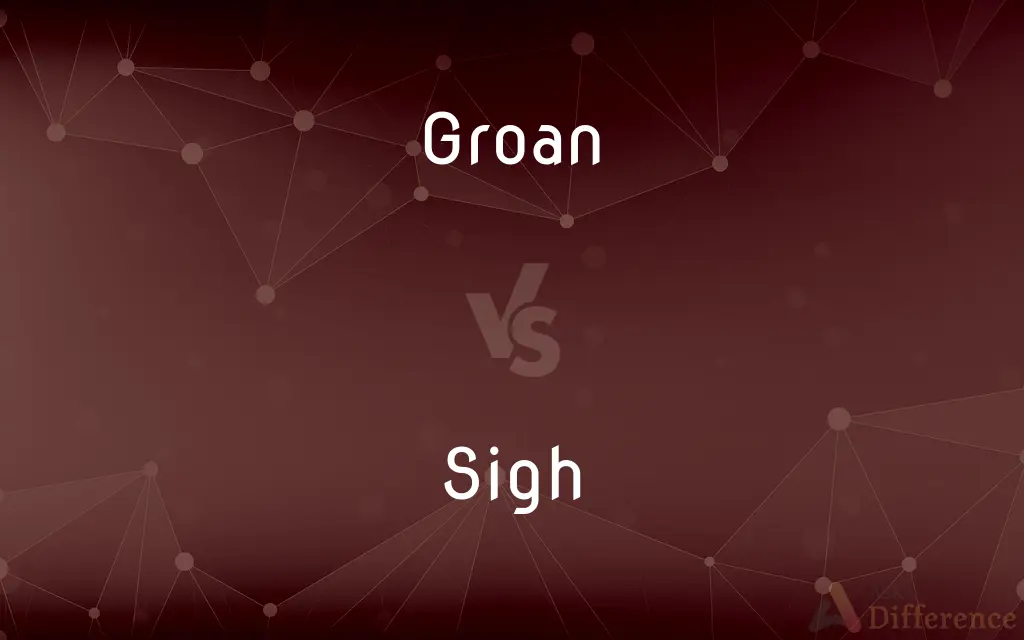Groan vs. Sigh — What's the Difference?
By Tayyaba Rehman & Urooj Arif — Updated on April 2, 2024
A groan expresses discomfort or displeasure, often louder and involuntary, whereas a sigh is a softer, voluntary exhalation signaling sadness, relief, or tiredness.

Difference Between Groan and Sigh
Table of Contents
ADVERTISEMENT
Key Differences
Groaning is a vocalization that typically indicates pain, effort, or discomfort. It's an audible expression that often comes involuntarily when someone is subjected to a stressful or strenuous situation. Whereas sighing, on the other hand, is usually a quieter, more controlled exhalation of air, often used to convey a wide range of emotions such as relief, sadness, or exasperation.
While a groan might be associated with physical exertion or distress, indicating a stronger, negative reaction to physical or emotional pain, a sigh is often seen as a release of emotional tension. A sigh can signify resignation, weariness, or even contentment, marking a moment of emotional transition.
Groans are more likely to be produced in response to acute, tangible discomforts, such as bumping one's toe or lifting a heavy object. These sounds are reflexive and signal an immediate reaction to physical pain or hardship. On the other hand, sighs may follow moments of reflection, decision-making, or realization, reflecting a broader and often more complex emotional state.
In social settings, groaning can be a clear signal to others of one's distress or dissatisfaction, possibly prompting sympathy or assistance. Conversely, sighing, while still communicative, often serves as a more subtle cue, indicating to others a need for space, a change in emotional state, or resignation to a situation.
Despite their differences, both groans and sighs are universal human expressions, transcending language and culture. They serve as non-verbal cues that can communicate feelings and states of mind effectively, often more so than words. Each, however, operates in its distinct context and serves different communicative purposes.
ADVERTISEMENT
Comparison Chart
Definition
An involuntary sound of discomfort or pain
A voluntary, often softer, exhalation of air
Typical Cause
Physical pain, effort, or displeasure
Emotional release, such as sadness or relief
Volume
Generally louder
Softer
Control
Involuntary
Voluntary
Emotional Context
Discomfort, frustration
Sadness, relief, contemplation
Compare with Definitions
Groan
A sound indicating effort or strain.
The athlete groaned with each push-up.
Sigh
An audible expression of resignation.
With a sigh, she agreed to the terms.
Groan
A sound made to express physical discomfort.
She let out a groan as she lifted the heavy box.
Sigh
A sound of exasperation or frustration.
She let out a sigh when the computer crashed again.
Groan
A vocal expression of displeasure or frustration.
He groaned at the thought of starting over.
Sigh
A long, deep breath expressing emotions like relief or sadness.
She sighed in relief after the exam.
Groan
An audible response to unbearable emotional pain.
After hearing the news, a groan escaped her lips.
Sigh
A sound denoting longing or weariness.
He sighed at the memory of his home.
Groan
An expression of disappointment.
The audience groaned when the game was postponed.
Sigh
A breath showing contentment or pleasure.
He sighed contentedly after the meal.
Groan
To voice a deep, inarticulate sound, as of pain, grief, or displeasure.
Sigh
Emit a long, deep audible breath expressing sadness, relief, tiredness, or similar
Harry sank into a chair and sighed with relief
Groan
To make a sound expressive of stress or strain
Floorboards groaning.
Sigh
A long, deep audible exhalation expressing sadness, relief, tiredness, or similar
The councils heaved a sigh of relief when they saved over £6m between them
She let out a long sigh of despair
Groan
To utter or express with groans or a groan.
Sigh
To exhale audibly in a long deep breath, as in weariness or relief.
Groan
The sound made in groaning.
Sigh
To emit a similar sound
Willows sighing in the wind.
Groan
A low, mournful sound uttered in pain or grief.
Sigh
To feel longing or grief; yearn
Sighing for their lost youth.
Groan
A low, guttural sound uttered in frustration, disapproval, or ecstasy.
Sigh
To express with or as if with an audible exhalation.
Groan
A low creaking sound from applied pressure or weight.
Sigh
(Archaic) To lament.
Groan
To make a groan.
We groaned at his awful jokes.
The wooden table groaned under the weight of the banquet.
Sigh
The act or sound of sighing.
Groan
(figurative) To seemingly creak under the strain of being heavily laden.
Sigh
(intransitive) To inhale a larger quantity of air than usual, and immediately expel it; to make a deep single audible respiration, especially as the result or involuntary expression of fatigue, exhaustion, grief, sorrow, frustration, or the like.
When she saw it wasn't damaged, she sighed with relief.
He sighed. It was going to be a long night.
He sighed over the lost opportunity.
Groan
(obsolete) To strive after earnestly, as if with groans.
Sigh
(intransitive) To lament; to grieve.
Groan
To give forth a low, moaning sound in breathing; to utter a groan, as in pain, in sorrow, or in derision; to moan.
For we . . . do groan, being burdened.
He heard the groaning of the oak.
Sigh
(transitive) To utter sighs over; to lament or mourn over.
Groan
To strive after earnestly, as with groans.
Nothing but holy, pure, and clear,Or that which groaneth to be so.
Sigh
(intransitive) To make a sound like sighing.
Groan
To affect by groans.
Sigh
(transitive) To exhale (the breath) in sighs.
She sighed a sigh that was nearly a groan.
Sigh a note and sing a note
Groan
A low, moaning sound; usually, a deep, mournful sound uttered in pain or great distress; sometimes, an expression of strong disapprobation; as, the remark was received with groans.
Such groans of roaring wind and rain.
The wretched animal heaved forth such groans.
Sigh
(transitive) To express by sighs; to utter in or with sighs.
"I guess I have no choice," she sighed.
She sighed her frustrations.
Groan
An utterance expressing pain or disapproval
Sigh
A deep, prolonged audible inhale and exhale of breath; as when fatigued, frustrated, grieved, or relieved; the act of sighing.
Groan
Indicate pain, discomfort, or displeasure;
The students groaned when the professor got out the exam booklets
The ancient door soughed when opened
Sigh
(figurative) a manifestation of grief; a lament.
Sigh
(Cockney rhyming slang) A person who is bored.
Sigh
An expression of fatigue, exhaustion, grief, sorrow, frustration, or the like, often used in casual written contexts.
Sigh, I'm so bored at work today.
Sigh
To inhale a larger quantity of air than usual, and immediately expel it; to make a deep single audible respiration, especially as the result or involuntary expression of fatigue, exhaustion, grief, sorrow, or the like.
Sigh
Hence, to lament; to grieve.
He sighed deeply in his spirit.
Sigh
To make a sound like sighing.
And the coming wind did roar more loud,And the sails did sigh like sedge.
The winter winds are wearily sighing.
Sigh
To exhale (the breath) in sighs.
Never man sighed truer breath.
Sigh
To utter sighs over; to lament or mourn over.
Ages to come, and men unborn,Shall bless her name, and sigh her fate.
Sigh
To express by sighs; to utter in or with sighs.
They . . . sighed forth proverbs.
The gentle swain . . . sighs back her grief.
Sigh
A deep and prolonged audible inspiration or respiration of air, as when fatigued or grieved; the act of sighing.
I could drive the boat with my sighs.
Sigh
Figuratively, a manifestation of grief; a lan ent.
With their sighs the airFrequenting, sent from hearts contrite.
Sigh
An utterance made by exhaling audibly
Sigh
A sound like a person sighing;
She heard the sigh of the wind in the trees
Sigh
Heave or utter a sigh; breathe deeply and heavily;
She sighed sadly
Sigh
Utter with a sigh
Common Curiosities
Can sighing be beneficial?
Yes, sighing can serve as an emotional or physiological reset, helping to relieve stress or tension.
Do sighs always indicate sadness?
No, sighs can express a range of emotions including relief, sadness, contentment, or exasperation, not just sadness.
Can a groan be voluntary?
Groans are generally involuntary, arising spontaneously from physical or emotional pain, unlike sighs, which are more controlled.
Are groans and sighs understood across different cultures?
Yes, both are considered universal non-verbal cues that can convey emotions and physical states across cultural boundaries.
How do people typically respond to hearing a groan vs. a sigh?
A groan might prompt concern or a desire to help, due to its association with discomfort, while a sigh might elicit sympathy or a more nuanced emotional response, depending on the context.
Is groaning a sign of serious health issues?
While groaning can signal discomfort or effort, persistent groaning, especially without a clear cause, should be evaluated by a healthcare professional.
What is the main difference between a groan and a sigh?
A groan typically indicates discomfort or displeasure, often related to pain or effort, while a sigh is a softer, more reflective expression of emotions like sadness, relief, or weariness.
Is it common to groan or sigh in sleep?
Yes, people can groan or sigh in their sleep, often as a part of natural breathing patterns or in response to dreams.
Do groans and sighs have specific meanings in language?
While not words, groans and sighs effectively communicate specific feelings and states non-verbally, adding nuance to interpersonal communications.
Is there a time when sighing or groaning is more likely?
Groaning is more likely during physical exertion or after experiencing pain, while sighing might occur in moments of emotional transition or reflection.
Can animals groan and sigh?
Animals, especially mammals, can produce sounds analogous to groaning and sighing, often in response to discomfort or contentment, respectively.
Is it possible to control groaning?
Groaning is more reflexive and harder to control than sighing, especially when caused by sudden pain or discomfort.
How do children learn to groan and sigh?
Children learn to groan and sigh through a combination of natural instinct and social learning, observing and mimicking the behavior of others.
What emotions might lead to sighing?
Sighing can result from a wide range of emotions, including but not limited to relief, sadness, longing, frustration, and contentment.
Can sighing too much be a problem?
Excessive sighing can sometimes indicate underlying health issues, such as respiratory problems or psychological stress, and might warrant medical attention.
Share Your Discovery

Previous Comparison
Dukkah vs. Zaatar
Next Comparison
Marine vs. SeaAuthor Spotlight
Written by
Tayyaba RehmanTayyaba Rehman is a distinguished writer, currently serving as a primary contributor to askdifference.com. As a researcher in semantics and etymology, Tayyaba's passion for the complexity of languages and their distinctions has found a perfect home on the platform. Tayyaba delves into the intricacies of language, distinguishing between commonly confused words and phrases, thereby providing clarity for readers worldwide.
Co-written by
Urooj ArifUrooj is a skilled content writer at Ask Difference, known for her exceptional ability to simplify complex topics into engaging and informative content. With a passion for research and a flair for clear, concise writing, she consistently delivers articles that resonate with our diverse audience.














































